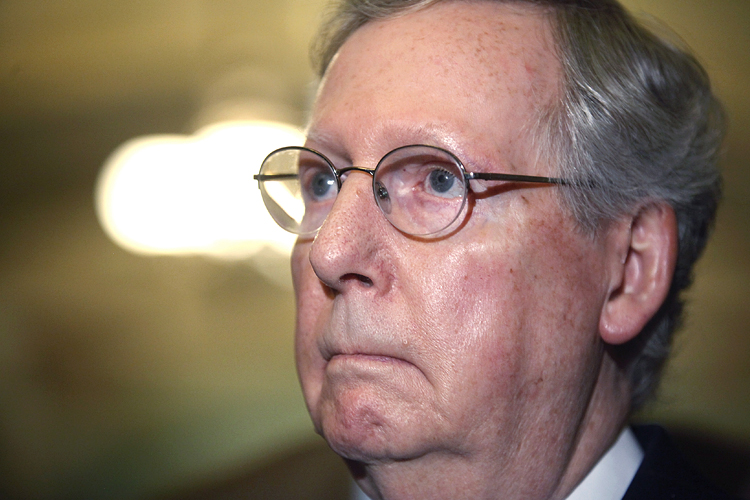Like any good legislator, Mitch McConnell is responsive to the complaints and hardships of his constituents. And, like every legislator, he relishes in weaving the anguish-ridden letters of his Kentucky faithful into the remarks he delivers on the Senate floor, thereby giving his political grandstanding a touch of homespun earnestness and feeling.
And when it came to the much-derided Affordable Care Act, there were more than enough constituent gripes for McConnell to enter into the Congressional Record.
For example, on December 11, 2013, McConnell read some Obamacare-related constituent letters that he found “noteworthy,” including one from a Louisville resident whose policy had been canceled and now had to purchase coverage through Kynect, the state’s health insurance exchange. “This is a single male, age 31, having to pay for pediatric dental care and maternity care, and he says it “doesn’t make a whole lot of sense to me,’” McConnell said. “He makes more than $100,000 a year and doesn’t qualify for a subsidy on the Obama exchange. So the current policy of this 31-year-old is being canceled.”
On January 28, McConnell again took to the Senate floor to describe the Obamacare horror stories he was told at a tele-townhall meeting the previous night. “This is a law that in some parts of my state is limiting choices to health care coverage to just two companies in the individual exchange market,” McConnell said, again referring to Kynect. “Kentucky has gotten more money to set up its exchange than every state except California, New York, Oregon, and Washington. That’s a lot of money. And they’ve still only enrolled 30 percent of the people they were supposed to at this point. How is that a success?”
The takeaway from these remarks is that Mitch McConnell, enemy of Obamacare, considered Kynect (“the Obama exchange”) to be linked to the law’s perceived failure, both in its cost and its poor coverage choices. That’s why it was a little surprising when, last week, McConnell described his push to repeal the Affordable Care Act as “unconnected” to any question of dismantling Kynect. To observers it seemed like McConnell was trying to segregate his state’s health exchange from the federal health law it operates under.
It’s only a little surprising because if you’ve been following the politics of the Affordable Care Act in Kentucky, then you know that McConnell’s hardline repeal stance was both necessary and untenable.
The Bluegrass State is one of the Affordable Care Act’s unlikely success stories – uninsured residents have been enrolling in Medicaid and singing up for coverage through the state exchange in droves. And it’s roiled the politics there. Kentuckians hate the president (32 percent approval), but they like Democratic Gov. Steve Beshear (56 percent approval). They hate “Obamacare,” but they are far less hostile to Kynect.
A savvy politician would try to carefully negotiate that divergence in public opinion, but McConnell doesn’t have the luxury of savviness. Facing a primary challenge from Tea Party upstart Matt Bevin, he stuck hard to the “full repeal” position so as not to alienate conservatives. (Being the top Republican in the Senate also demands that he not break with the rest of the leadership on the repeal issue.) That was fine in December and January, when the Obamacare rollout doldrums were still fresh in the public consciousness, but Kentucky’s healthcare situation only improved as the months rolled on. As of last month, well over 400,000 Kentucky residents had enrolled for coverage.
So now McConnell faces the conundrum lots of people saw coming from miles away. Thousands of Kentuckians have gained coverage either through Kynect or Medicaid, and McConnell’s platform has to this point endorsed stripping them of that coverage. He no longer has Bevin to worry about, but he still can’t abandon full repeal. So it’s to be expected that reporters are pressing him to explain just what his plan is for the people whose health coverage he wants to take away.
Stripped of the ability to be savvy, he’s being crude. Full repeal would obviously mean Kynect would die, but he can’t say that, so he says it’s “unconnected” to the issue of Obamacare’s repeal, even though it’s obviously not and just a few months ago he was using Kynect to rail against Obamacare in the Senate. It’s transparent nonsense, but at this point transparent nonsense is his best option.
McConnell’s been lucky so far in that he made the “unconnected” remark just days after his crushing primary victory over Bevin. The afterglow, plus the fact that he said it on a Friday afternoon before a holiday weekend, has resulted in relatively scant press coverage. And, for whatever reason, the political press seem more interested in asking whether Alison Lundergan Grimes (and other Democratic Senate hopefuls) would have voted for the Affordable Care Act in 2010.
But McConnell’s problems will only mount as he’s stuck arguing that he’ll fully repeal Obamacare, but somehow not the parts that Kentucky likes.

